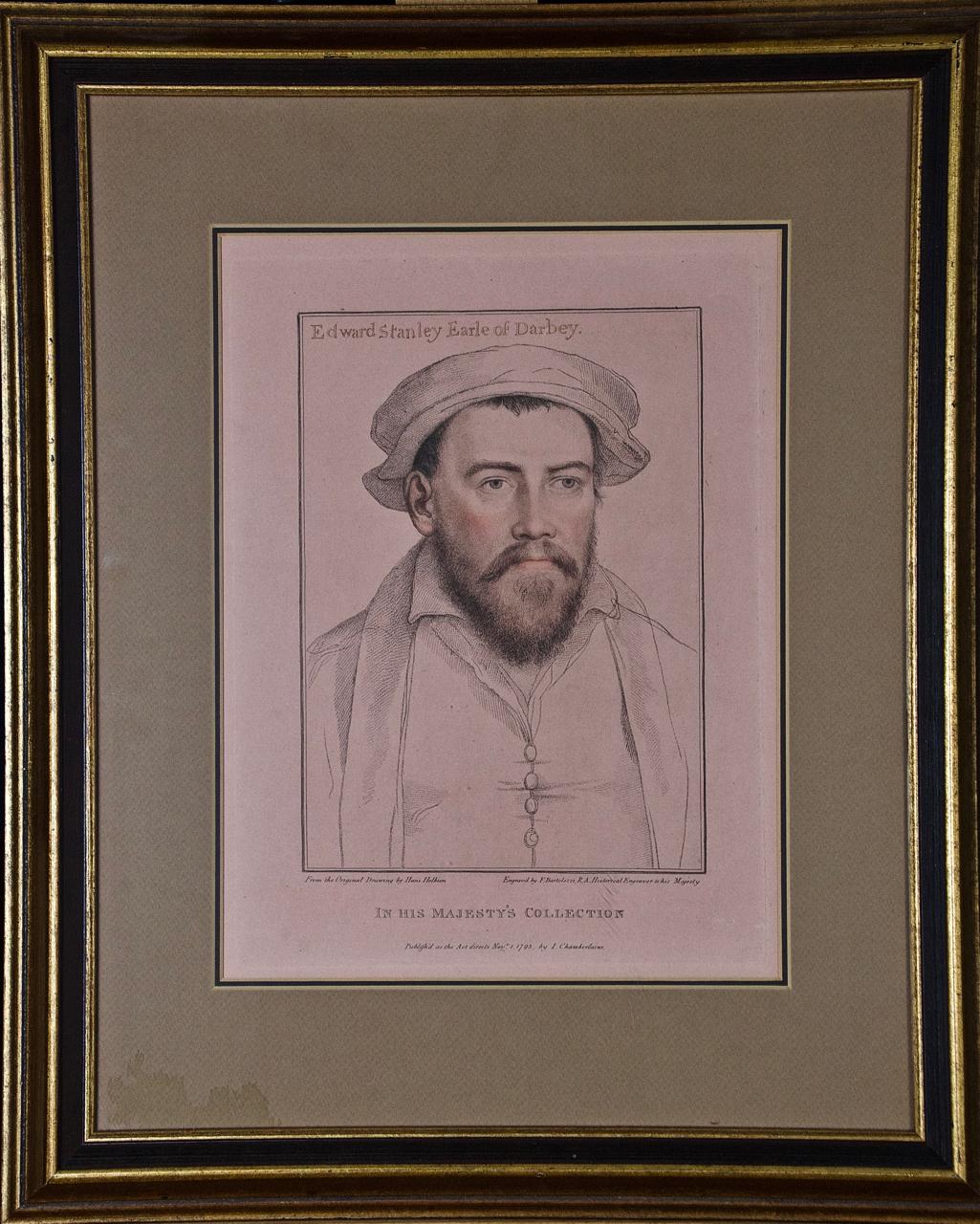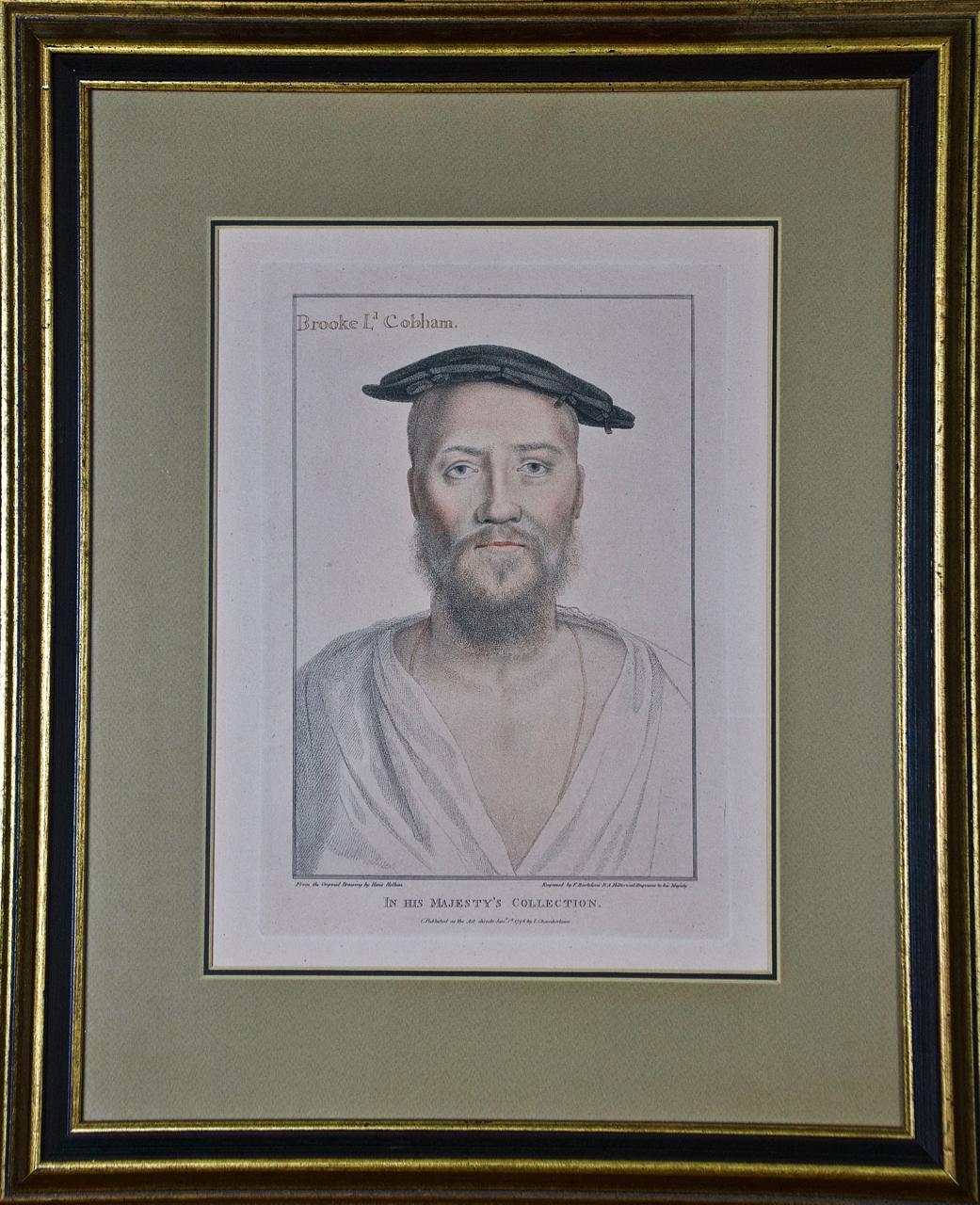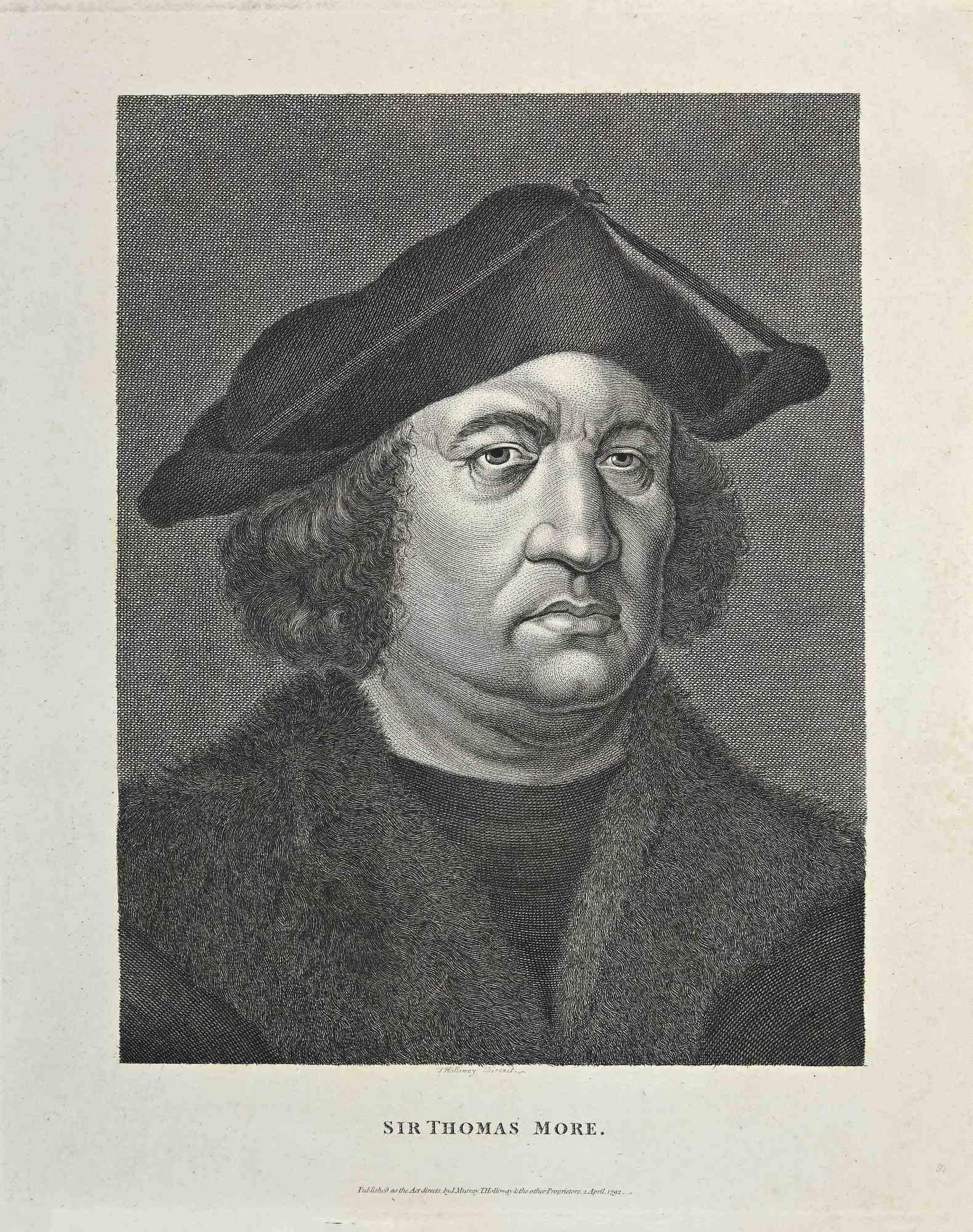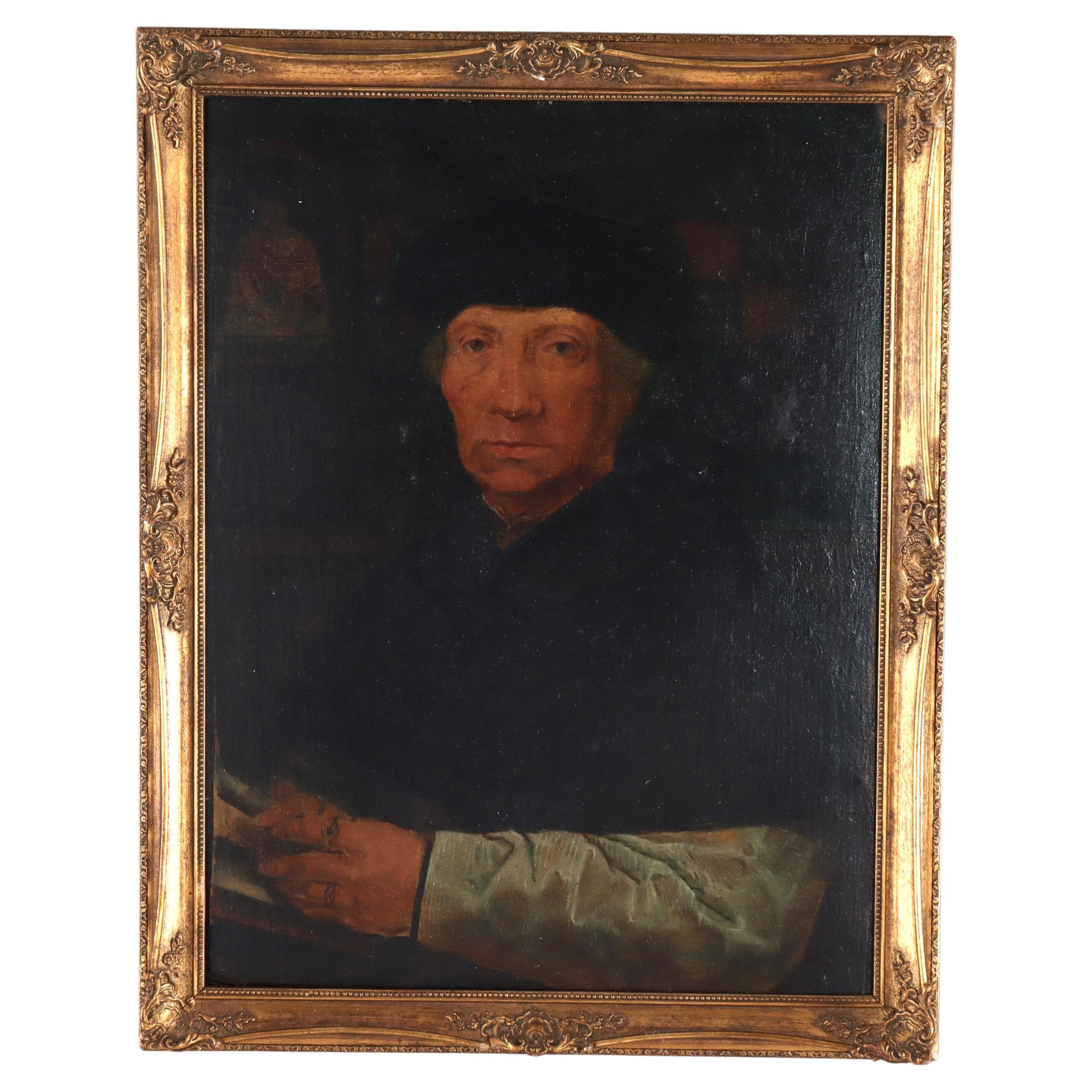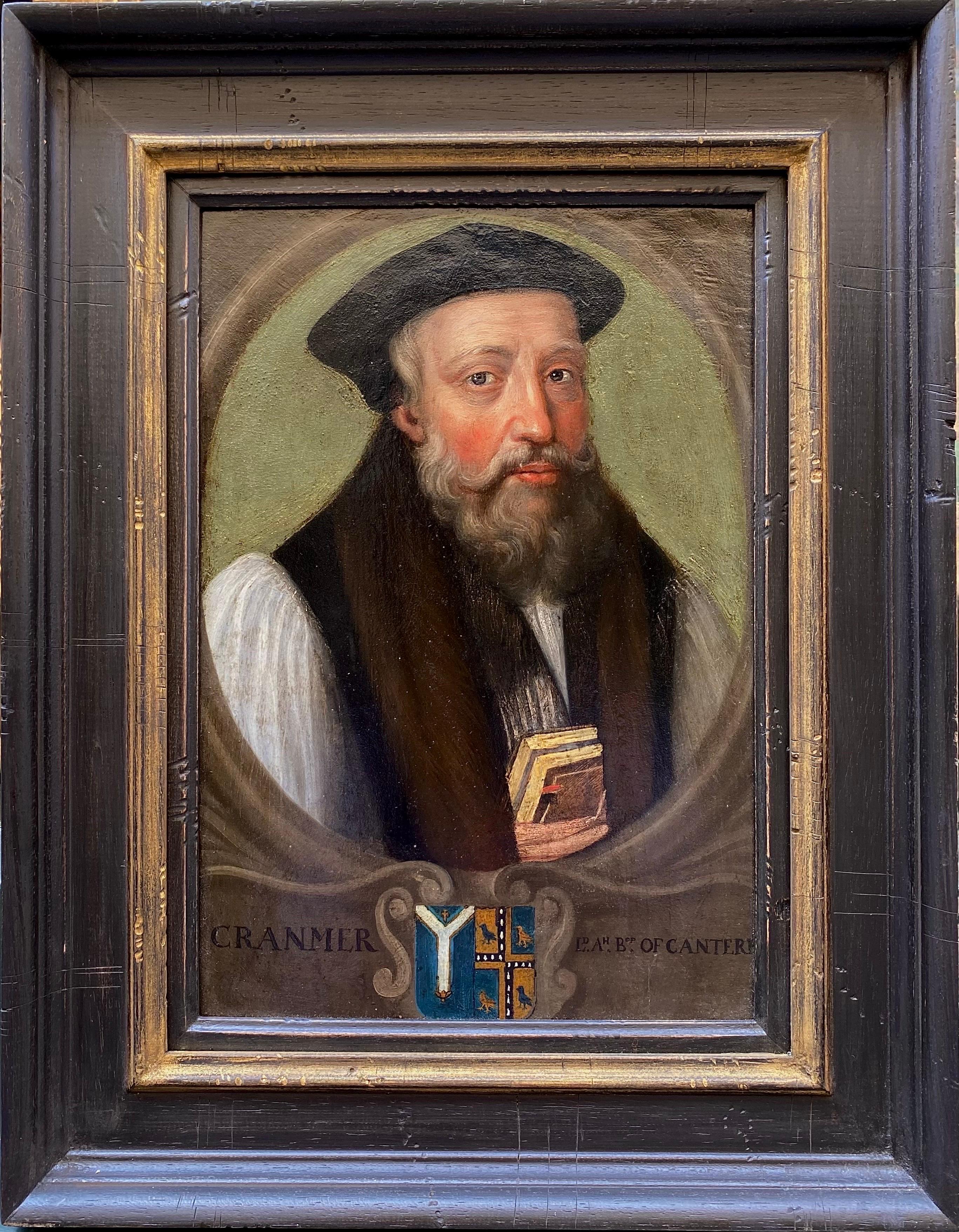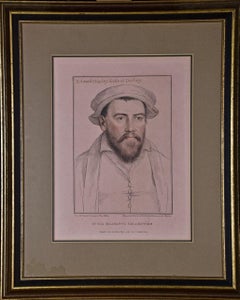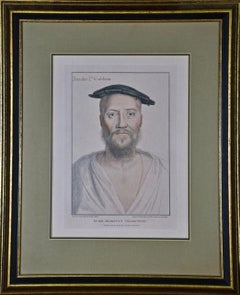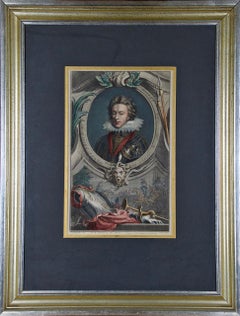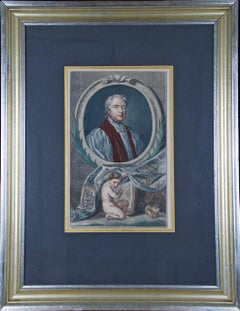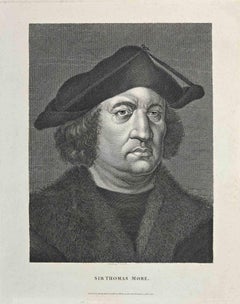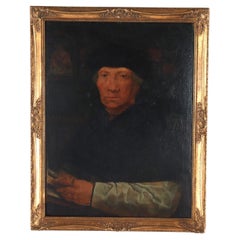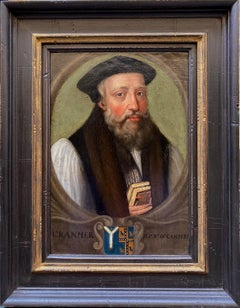Items Similar to Holbein Hand-colored Portrait of Warham, Archbishop of Canterbury for Henry VIII
Want more images or videos?
Request additional images or videos from the seller
1 of 7
(After) Hans Holbein The YoungerHolbein Hand-colored Portrait of Warham, Archbishop of Canterbury for Henry VIII1795
1795
$875
£666.62
€768.64
CA$1,224.54
A$1,368.22
CHF 715.73
MX$16,778.82
NOK 9,145.71
SEK 8,672.56
DKK 5,736.74
Shipping
Retrieving quote...The 1stDibs Promise:
Authenticity Guarantee,
Money-Back Guarantee,
24-Hour Cancellation
About the Item
This framed hand colored stipple engraving and etching portrait of William Warham, Archbishop of Canterbury under King Henry VII and his son King Henry VIII was created by Francesco Bartolozzi (1728–1815) after a drawing and a painting by Hans Holbein (1497-1543), who was Henry VIII's court painter. The print was published in London by John Chamberlaine in 1795. The print was created utilizing stipple engraving and etching techniques by the Italian artist Francesco Bartolozzi, who was employed as the royal engraver by King George III of England. The publisher, John Chamberlaine, was Keeper of the King's Drawings and Medals. The inscription beneath the portrait reads" "In His Majesty's Collection", "Engraved by F. Bartolozzi R A Historical Engraver to His Majesty'' in the lower right, and ''From an original drawing by Hans Holbien'' in the lower left. The original painting by Holbein is displayed at Lambeth Castle and the original drawing is in the art collection at Windsor Castle. The engraving is held by many museums, including: The British Museum, The Metropolitan Museum of Art, The National Portrait Gallery, The Chicago Art Institute and The Fine Arts Museums of San Francisco.
This portrait depicts Archbishop William Warham facing to his right, wearing a black cap covering his ears and fur trimmed clerical robes. The print is presented in a decorative gold-colored wood frame with a blue-grey fabric mat. The frame measures 26.5" x 20.13" x 1". The print is in excellent condition.
William Warham (1450-1532) was the last of the pre-Reformation archbishops of Canterbury, serving under King Henry VII and then under King Henry VIII. He was a quiet, unassuming intellectual whose career ended with a strong and brave stance against the divorce of King Henry VIII and the king's resultant withdrawal of England from the Catholic church and his draconian actions against the clergy. As Lord Chancellor from 1504 to 1515, William Warham was the man who crowned Henry VIII and his first wife, Catherine of Aragon (1485-1536) in 1509. He remained faithful to the Roman Catholic Church all his life and when, after 1529, Parliament took more and more steps to restrict the authority of the Pope during the conflict over the King's divorce, the archbishop protested. However, unlike many others, like St. Thomas Becket, the earlier archbishop whom he revered and Thomas More, he was not beheaded for his fidelity to the Catholic Church. He died of natural causes at age 82 in 1532.
Warham was educated at Winchester School and New College, Oxford, earning a doctorate of laws. He later became the Keeper of the Great Seal and eventually Pope Julius II nominated him as Archbishop of Canterbury and King Henry VII made him Lord Chancellor of England. He took a leading part in all important national business, and Oxford University chose him as Chancellor in 1506. In 1509 he crowned the new King Henry VIII and Catherine of Aragon. Over time there were conflicts with the increasing influence of Cardinal Wolsey. As a result, he resigned the office of Lord Chancellor. Warham's power was still further diminished in 1517 when Wolsey was appointed papal legate, and from that time forward there were constant official differences between them, though their private relations continued friendly. When the Henry and Catherine's divorce question was first raised in 1527 he was Wolsey's assessor in the secret inquiry into the validity of the king's marriage. He steadfastly refused to oppose the king's wishes, under threats from the king that unless he was complaisant all ecclesiastical authority in England would be destroyed. In the summer of 1530 signed the petition to the pope begging him to allow the divorce. On Wolsey's fall from favor, the king wished the whole case to be submitted to Warham's decision, but the pope refused on the ground that his signature of the petition made him an unfit judge. Warham eventually formally protested against all Acts of Parliament derogatory to the pope's authority or the prerogatives of Canterbury. Three months later Warham died. His private life was simple and austere and he died "without money and without debts".
- Creator:(After) Hans Holbein The Younger (1497 - 1543, German)
- Creation Year:1795
- Dimensions:Height: 26.5 in (67.31 cm)Width: 20.13 in (51.14 cm)Depth: 1 in (2.54 cm)
- Medium:
- Period:
- Condition:
- Gallery Location:Alamo, CA
- Reference Number:Seller: # 2801stDibs: LU117326015702
About the Seller
5.0
Platinum Seller
Premium sellers with a 4.7+ rating and 24-hour response times
Established in 2011
1stDibs seller since 2019
285 sales on 1stDibs
Typical response time: 1 hour
- ShippingRetrieving quote...Shipping from: Alamo, CA
- Return Policy
Authenticity Guarantee
In the unlikely event there’s an issue with an item’s authenticity, contact us within 1 year for a full refund. DetailsMoney-Back Guarantee
If your item is not as described, is damaged in transit, or does not arrive, contact us within 7 days for a full refund. Details24-Hour Cancellation
You have a 24-hour grace period in which to reconsider your purchase, with no questions asked.Vetted Professional Sellers
Our world-class sellers must adhere to strict standards for service and quality, maintaining the integrity of our listings.Price-Match Guarantee
If you find that a seller listed the same item for a lower price elsewhere, we’ll match it.Trusted Global Delivery
Our best-in-class carrier network provides specialized shipping options worldwide, including custom delivery.More From This Seller
View All18th C. Portrait of Edward Stanley from Henry VIII's Court after Holbein Drawing
By Hans Holbein
Located in Alamo, CA
This is an 18th century engraved portrait of "Edward Stanley" created by Francesco Bartolozzi (1728–1815), after a drawing by Hans Holbein the Younger (1497- 1543) in the 16th century. Holbein was the official artist in the court of King Henry VIII. Bartolozzi used both etching and stipple engraving techniques to create the work which was published by John Chamberlaine in London in 1793 in "The Book of Imitations of Original Drawings by Hans Holbein in the Collection of His Majesty".
Edward Stanley, 3rd Earl of Derby...
Category
Late 18th Century Old Masters Portrait Prints
Materials
Engraving, Etching
18th C. Bartolozzi Portrait of Brooke Cobham from a 16th Century Holbein Drawing
By Hans Holbein
Located in Alamo, CA
This is an 18th century engraved portrait of Brooke Cobham, a nobleman in King Henry VIII's court, created by Francesco Bartolozzi (1728–1815), after a drawing by Hans Holbein the Younger (1497- 1543) in the 16th century. Holbein was the official artist in the court of King Henry VIII. Bartolozzi used both etching and stipple engraving techniques to create the work which was then was printed in color on pink paper and hand finished with watercolor. It was published by John Chamberlaine in London in 1793 in "The Book of Imitations of Original Drawings by Hans Holbein in the Collection of His Majesty".
Sir George Brooke, Baron Cobham (1497-1558) was a prominent member of King Henry VIII's royal court. He became a member of parliament in 1529 and served as a peer in the trial of Queen Anne Boleyn, which resulted in her beheading. He was rewarded for his political and military service to King Henry and Britain with land, castles and former monasteries and was made a Knight of the Garter, a prestigious membership limited to the king and a very limited number of prominent British subjects. As a member of the Privy Council following the death of young King Edward VI (Henry VIII's son), he fell out of favor when he signed a ruling disinheriting both of Henry VIII's daughters, Mary and Elizabeth, in favor of Lady Jane Grey...
Category
Late 18th Century Old Masters Portrait Prints
Materials
Engraving, Etching
Hand-Colored Houbraken Portrait of "Henry, Prince of Wales, Son of James"
By Jacobus Houbraken
Located in Alamo, CA
A hand-colored portrait of Henry Prince of Wales, Son of James, engraved and etched by the Dutch master of portraits Jacobus Houbraken (1698-1780...
Category
Mid-18th Century Naturalistic Portrait Prints
Materials
Engraving, Etching
Tillotson, Archbishop of Canterbury: An 18th C. Hand-Colored Portrait by Kneller
By (After) Sir Godfrey Kneller
Located in Alamo, CA
This is a hand-colored portrait of John Tillotson, Archbishop of Canterbury, engraved and etched by the Dutch master of portraits Jacobus Houb...
Category
Mid-18th Century Naturalistic Portrait Prints
Materials
Engraving, Etching
Viscount Thomas Belasise: 17th Century Hand-colored Portrait by Robert White
Located in Alamo, CA
This is a hand-colored engraving by Robert White (1645-1703) after a painting by Abraham Blooteling (or Bloteling) (1634–1690) entitled "The Effigies of the Right honorable: Thomas B...
Category
Late 17th Century Other Art Style Portrait Prints
Materials
Engraving
Canterbury: An Original 16th C. Framed Hand-colored Map by Braun & Hogenberg
By Franz Hogenberg
Located in Alamo, CA
This is a framed 16th century map and city view of Canterbury, England entitled "Cantuarbury" by Braun & Hogenburg, from their famous landmark atlas of city views 'Civitates Orbis Terrarum' (Atlas of the Cities of the World), which was first published in Cologne, Germany in 1572. The map of Canterbury was first published in 1588. It depicts a detailed birdseye view of the completely walled and fortified city of Canterbury, with its cathedral the most prominent feature. The coat of arms of England, Canterbury, and the Archbishop of Canterbury are included.
This beautifully hand-colored map is presented in a gold-colored wood frame with a beaded inner trim and a paprika-colored mat that highlights details in the map. The frame measures 18.75" high by 22.25" wide by 0.875" deep. There is a central vertical fold, as issued. The map is in excellent condition.
Braun and Hogenberg's 'The Civitates Orbis Terrarum' was the second atlas of maps ever published and the first atlas of cities and towns of the world. It is one of the most important books published in the 16th century. Most of the maps in the atlas were engraved by Franz Hogenberg and the text, with its descriptions of the history and additional factual information of the cities, was written by a team of writers and edited by Georg Braun. The work contained 546 bird-eye views and map views of cities and towns from all over the world. It gave graphic representation of the main features of the illustrated cities and towns, including the buildings and streets. Although the ordinary buildings are stylized, the principal buildings are reproduced from actual drawings created on location. The principal landmarks and streets can still be recognized today. In addition, the maps often include the heraldic arms of the city, the nature of the surrounding countryside, the important rivers, streams and harbors, even depicting stone bridges, wooden pontoons, flat-bottomed ferries, ships and working boats, wharves and jetties, as well as land-based activities, including horsemen, pedestrians, wagons, coaches, and palanquins. Small vignettes are often included which illustrate the trade, occupations and habits of the local inhabitants, such as agriculture, paper-making and textiles, as well as local forms of punishment, such as gibbets, wheels, floggings etc. Large figures dressed in their local costume are often presented out of proportion in the foreground. The aim of the authors was to give as much information as possible in a pleasing visual form. They succeeded in creating maps that were both informative and decorative works of art. The atlas is a wonderful glimpse of life in medieval Europe.
Georg Braun (1541-1622) was German Catholic...
Category
16th Century Old Masters Landscape Prints
Materials
Engraving
You May Also Like
Portrait of Sir Thomas More - Original Etching by Thomas Holloway - 1810
By Thomas Holloway
Located in Roma, IT
Portrait of Sir Thomas More is an original artwork realized by Thomas Holloway (1748 - 1827).
Original Etching from J.C. Lavater's "Essays on Physiognomy, Designed to promote the Kn...
Category
1810s Old Masters Portrait Prints
Materials
Etching
Large Hans Holbein School Oil on Board Portrait by Quentin Matsys C1885
Located in Big Flats, NY
Large Antique Giltwood Framed Hans Holbein School Oil on Board Portrait by Quentin Matsys C1885.
Measures - 79.5"H x 48.5"W x .5"D.
This oil on board portrait is in the manner ...
Category
Antique 19th Century Paintings
Materials
Wood
$960 Sale Price
20% Off
Antique English Colored Original Engraving of an English Gentleman 1919
Located in Douglas Manor, NY
3905 English Gentleman hand colored engraving set in a custom made frame
Image size 14x10"
Category
1910s Portrait Prints
Materials
Archival Ink, Laid Paper
Portrait of Thomas Cranmer, Archbishop of Canterbury, Mid 16th Century Oil
Located in London, GB
Oil on panel
Image size: 12 1/2 x 8 3/4 inches (31.75 x 22.25 cm)
Period style hand made frame
This is a portrait of Thomas Cranmer (1489 - 1556). Cranmer was the Archbishop of Canterbury in the reign of Henry VIII and launched the English Reformation. Few people have played so important a part in shaping the course of English history or had a more profound influence on England's language and literature than Thomas Cranmer.
At the bottom of the painting Cranmer's name and title is inscribed. At the centre there is also Cranmer's coat of arms, the left half is the arms that all archbishops of Canterbury adopt and it has been enjoin to his own family arms...
Category
16th Century Portrait Paintings
Materials
Oil, Panel
Portrait Of Thomas Smythe (1514-1577) School of Hans HOLBEIN (1497-1543)
By Hans Holbein
Located in Blackwater, GB
Portrait Of Thomas Smythe (1514-1577), 16th Century
School of Hans HOLBEIN (1497-1543)
Fine huge 16th Century English Old Master portrait of Sir Thomas...
Category
16th Century Old Masters Portrait Paintings
Materials
Oil
$21,850 Sale Price
20% Off
Henry VIII Founder of Trinity College, Cambridge engraving for Ackermann
Located in London, GB
To see our other Oxford and Cambridge pictures, including an extensive collection of works by Ackermann, scroll down to "More from this Seller" and below it click on "See all from th...
Category
1810s Realist Prints and Multiples
Materials
Engraving, Aquatint
